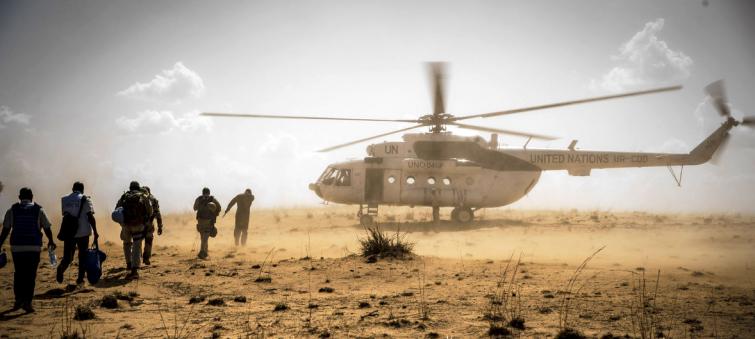
Implementing peace deal only path for stabilization in Mali: UN peacekeeping chief
New York/IBNS: Implementation of the 2015 peace agreement in Mali provides the only pathway for stabilization there, the head of UN peacekeeping told the Security Council on Wednesday.
Jean-Pierre Lacroix updated ambassadors on developments in the West African country, where a UN operation, known by the French acronym MINUSMA, supports political processes and restoration of state authority against a backdrop of insecurity, intercommunal violence and increasing displacement.
MINUSMA was established following fighting between Government forces and Tuareg rebels in January 2012, leading to the occupation of northern Mali by radical Islamists.
The authorities and two separate armed group coalitions signed the peace deal three years later.
“The rapid and thorough implementation of the peace agreement remains the only viable path for the stabilization of Mali. It provides the framework for the required political and institutional reforms to restore and decentralize State authority, to build a Malian state that reflects the diversity and interests of all its citizens”, said Mr. Lacroix.
“The peace agreement also provides for mechanisms to address the grievances of those Malians who feel excluded from the country’s political life and economic development and who see little hope for their future.”
National dialogue concludes
Despite slow starts and disagreements, both between and among the sides, the UN peacekeeping chief reported that progress has been achieved in Mali, such as the holding of an inclusive national dialogue which concluded in December.
Foreign Minister Tiébilé Dramé characterized it as a milestone for his country.
“The national dialogue was an important point in the life of the nation: a point at which a true national consensus was forged with lively solidarity,” he said, speaking via videoconference.
“For his part, the President of Mali has taken the commitment of doing everything in his power to ensure that the resolutions and recommendations of the national dialogue, pursuant to current law, be implemented.”
Regional plans
Another step forward has been the disarming and subsequent integration of former combatants into the national defence and security forces.
Mr. Lacroix said redeploying reconstituted army units to the north remains an “urgent priority”, with a first battalion expected in the region by the end of the month: an important step towards restoring state authority nation-wide.
At the same time, the UN has increased its presence and activity in Mopti, located in central Mali, which has contributed to de-escalating intercommunal violence and massacres.
However, this has meant diverting assets from the north, leading to what Mr. Lacroix described as “dangerous gaps” in some areas. To address the challenge, MINUSMA will make some adaptations within its authorized troop strength.
“The plan provides for the establishment of a Mobile Task Force, which will enhance the Mission’s ability to implement its mandate and protect civilians. It will make MINUSMA more agile, flexible and mobile with tailored units and enhanced capabilities, most importantly additional air mobility”, he explained, before calling on ambassadors for their support.
Support for the Sahel
Lacroix began his briefing by addressing the “alarming” deteriorating security situation not only in Mali but in the wider Sahel.
Just last week alone, 89 soldiers from Niger were killed and 18 peacekeepers injured in two separate attacks. There has also been a rise in the use of improvised explosive devices (IEDs) against UN convoys.
“Terrorism continues to feed into inter-communal violence in the centre of Mali,” he reported. “There are now more displaced persons suffering from hunger in the Mopti region than there were in the past.”
The United Nations supports the G5 Sahel regional body, which brings together Burkina Faso, Chad, Mali, Mauritania and Niger, all of which are experiencing rising extremist violence.
French ambassador Nicolas de Rivière told the Council that following a recent summit held in his country, the G5 and its international partners have established a coalition for the Sahel.
“The aim is to step up our support for countries of the G5 Sahel, but also beyond that to incentivize them to engage in reform: of course, security reform, but also governance and human rights reform,” he said. “With these conditions being met, we can eradicate terrorism.”
Photo caption and credit:
MINUSMA/Harandane Dicko
UN peacekeepers return to their helicopter following a mission to the village of Sobane Da in the Mopti region of Mali.
Support Our Journalism
We cannot do without you.. your contribution supports unbiased journalism
IBNS is not driven by any ism- not wokeism, not racism, not skewed secularism, not hyper right-wing or left liberal ideals, nor by any hardline religious beliefs or hyper nationalism. We want to serve you good old objective news, as they are. We do not judge or preach. We let people decide for themselves. We only try to present factual and well-sourced news.







